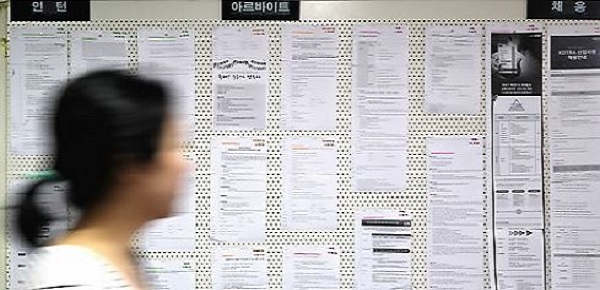The ratio of long-term unemployed people to the total jobless in South Korea reached an 18-year high in July, data showed Wednesday, as companies were reluctant to offer quality jobs amid uncertainties over their future.
The long-term unemployed numbered 180,000 in July, accounting for 18.7 percent of the total jobless and marking the highest figure since 19.7 percent for September 1999, shortly after the country's foreign exchange crisis, according to the data from Statistics Korea.
Long-term unemployed refers to individuals who have been looking for work for six months or longer. The number of the country's long-term unemployed tends to hit a nadir in February and peak in September or October when large companies start their second-half hiring.
The long-term unemployed numbered 180,000 in July, accounting for 18.7 percent of the total jobless and marking the highest figure since 19.7 percent for September 1999, shortly after the country's foreign exchange crisis, according to the data from Statistics Korea.
Long-term unemployed refers to individuals who have been looking for work for six months or longer. The number of the country's long-term unemployed tends to hit a nadir in February and peak in September or October when large companies start their second-half hiring.

In light of that, the portion is feared to rise further for August, flirting with the post-crisis level. On a month-on-month basis, the figure has been on the rise since November last year.
Analysts attributed the surge in the ratio to a lack of quality job openings, which forces jobless people to look for work for a long period of time.
"The rise in the number of long-term unemployed people means that there are still many people who can't find jobs they want as the quality of job openings has yet to recover fully," a government source said. "A prolonged slump in the labor market is also partly responsible."
Despite a steady rise in the number of employed people, South Korea remains gripped by rising youth unemployment amid a yearlong increase in the number of the self-employed.
The number of employed people rose by more than 300,000 for the sixth straight month in July. The unemployment rate for young people, aged between 15 and 29, was 9.3 percent last month, slightly up from 9.2 percent tallied a year earlier but down from June's 10.5 percent. The country's headline jobless rate stood flat at 3.5 percent in July. (Yonhap)



















![[Today’s K-pop] BTS pop-up event to come to Seoul](http://res.heraldm.com/phpwas/restmb_idxmake.php?idx=642&simg=/content/image/2024/04/17/20240417050734_0.jpg&u=)